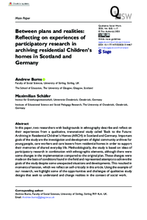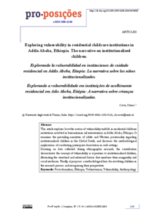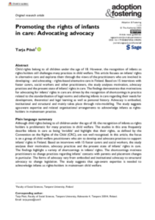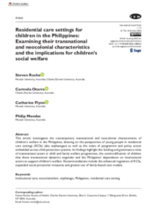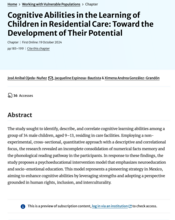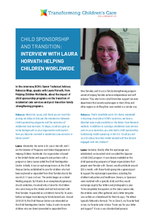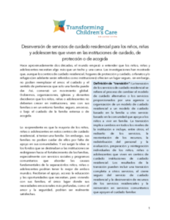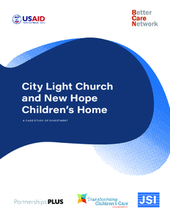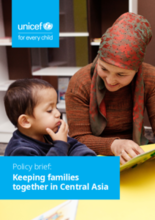Displaying 21 - 30 of 1510
In this paper, two researchers with backgrounds in ethnography describe and reflect on their experiences from a qualitative, transnational study called 'Back to the Future: Archiving in Residential Children's Homes (ARCH) in Scotland and Germany. Important goals of the study are the investigation and development of digital community archives for young people, care workers and care leavers from residential homes in order to support their memories of shared everyday life.
This article examines how vulnerability is constructed and experienced within residential childcare institutions involved in humanitarian interventions in Addis Ababa, Ethiopia, with particular attention to adult narratives and Western positionality. Drawing on ethnographic research, it deconstructs structural and relational factors shaping children’s marginalisation and proposes methodological approaches that centre children’s perspectives in research.
This article explores how infants’ rights in alternative care are understood and advocated for by practitioners in Finland, drawing on interviews with foster carers, social workers, and other professionals. The findings show that advocacy is driven by recognition of gaps in standardised practice and is enacted through embodied, institutional, and structural approaches, highlighting the need for age-aware expertise to fully recognise infants as rights holders in care.
This article investigates the contemporary transnational and neocolonial characteristics of children’s welfare in the Philippines, drawing on the perspectives of young people in residential care settings as well as the views of programme and policy actors embedded across child protection systems.
This study sought to identify, describe, and correlate cognitive learning abilities among a group of 34 male children, aged 9–13, residing in care facilities in Mexico. This model represents a pioneering strategy in Mexico, aiming to enhance cognitive abilities by leveraging strengths and adopting a perspective grounded in human rights, inclusion, and interculturality.
In this interview, BCN’s Senior Technical Advisor, Rebecca Nhep, speaks with Laura Horvath, from Helping Children Worldwide, about the impact of child sponsorship programs on the transition of residential care services and post transition family strengthening programs.
In this workshop panelists explored UNICEF's Data and Analytics Section's protocols and tools for gathering data on children in residential care.
Hace aproximadamente dos décadas, el mundo empezó a entender que los niños, niñas y adolescentes necesitan algo más que un techo y una cama.
This case study documents the complex process undertaken by a donor partner in Ireland* to push for the transition of their partner residential care service provider in Ghana. It follows their journey through the early stages of transition and eventually leads to their decision to divest of their funding and partnership.
This UNICEF policy brief finds that an estimated 203 children for every 100,000 children live in residential care across Central Asia – almost double the global average of 105 per 100,000. In this brief, UNICEF proposes seven policy recommendations to facilitate the closure of large-scale institutions and transition to family-based alternatives to institutional care in Central Asia.

